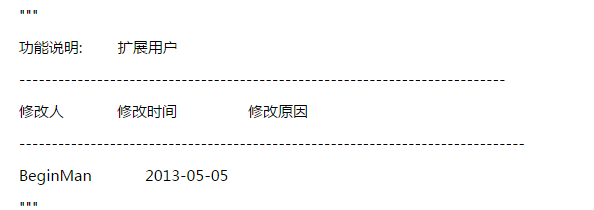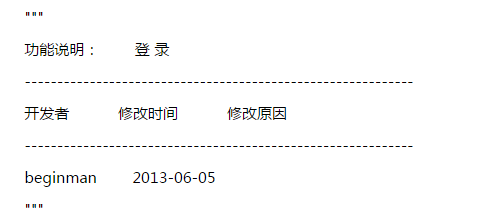Home > Article > Backend Development > Summary of solutions to common Django errors
1. Template type error:
Cause of error: return:
class UserProfile(models.Model):

is missing in models user=models.OneToOneField(User,blank=True,null=True ,related_name='user',verbose_name=_(u'user'))
company_name=models.CharField(u'company (or agent) name',max_length=30, default='unknown') #Company name
Product=models.ForeignKey(Product, blank=True,null=True,verbose_name=_(u'product')) #Product
class Meta:
verbose_name_plural = _(u'User Configuration')
def __unicode__(self):
[Here]_(u'%(user_name)s') % {'user_name':self.user.username}
Add return here That’s it.
2. URL-related errors
, static files cannot be accessed, such as the style cannot be produced
css style cannot be produced, after struggling for more than an hour, it turns out that urlpatterns is written like this:
urlpatterns = patterns('',
(r'^ $','login.msg.index'), #首页
)
#Login registration
urlpatterns = patterns('',
(r'^accounts/register/$','login.msg.register_page'), #Register
(r'^accounts/login/$','login.msg.login'), #Login
( r'^accounts/logout/$','django.contrib.auth.views.logout',{'next_page':'/'}), #Django provides a dedicated logout form function logout
(r' ^accounts/register/success/$','django.views.generic.simple.direct_to_template',{'template':'registration/register_success.html'}), #Registration successful
)
#admin backstage Manage
urlpatterns += patterns('',
(r'^admin/doc/', include('django.contrib.admindocs.urls')),
(r'^admin/', include(admin .site.urls)),
)
#Static file access
urlpatterns += patterns('',
) (r'^site_media/(?P
.*)$', 'django.views. static.serve', {'document_root': settings.MEDIA_SITE}),I also wrote = after the [Login Registration] url instead of +=, which caused the url to be overwritten, so the static file could not be loaded, and the homepage would not be opened.
3. Coding error
, the error type is as follows:
DjangoUnicodeDecodeError at /admin/books/book/
'ascii' codec can't decode byte 0xe8 in position 0: ordinal not in range (128). You passed in
()
Solution:
Confused the str and unicode data types in python2.
(0), what you need is to use the actual encoding instead of ascii
(1), for the code that requires str->unicode, you can write
import in front sys
reload(sys)
sys.setdefaultencoding('utf8')
Change str encoding from ascii to utf8 (or gb18030)
(2), python3 Distinguish between unicode str and byte array, and the default encoding is no longer ascii
Reference: http://vososo.com/vo/558
4. Other errors
, Django POST request error forbidden (403) CSRF verification failed. Request aborted
Add
MIDDLEWARE_CLASSES in settings.py and re-runserver . OK
Key Points Reference: http://blog.csdn.net/feng88724/article/details/7221449
I am using django1.2.3. When using session, the same error will occur as above. In this case, comment out the following. Available:(r'^account/login/$', 'login'), = "Post": r Try:
username = request.post.get ('username')
password = request.get.get ('password')
 if user.is_active:
if user.is_active:
Login (Request, User)
RTURN HTTPRESPONSE ('OK')
ELSE:
RTURN HTTPRESPONSE t exception , E: o Log.error ("Login: % S" % STR (E))
Return Render_to_response ('Account/login.html')
Of course from django.contrib.auth import authenticate, login
This is a bad thing, because there are two logins. This leads to the above problem. There are two solutions,
, modify the name of the login view function and the corresponding in url. Such as webLogin
, import settings: from ..login as _login This is also OK, don’t forget to change it.
, unable to jumpFor example, I want to log in. Then jump to the home page after successful login, as above: Rewrite the above code as follows
....
if user.is_active:
Rewrite the above code like this
pResponseRedirect('/' )
....
But the jump is not implemented, as follows:
It’s not that the jump is wrong, but I didn’t notice that my login interface is in the form of ajax POST. The code is as follows:
//登录
function _submit(){
var username = $("input[name='username']").val();
var password = $("input[name='password']").val();
if (username == ""){
art.dialog({content: '用户名不能为空',time :1.5});
}else if(password == ""){
art.dialog({content: '密码不能为空',time :1.5});
}else{
$.post('/account/login/',{'username':username,'password':password},function(data){
if (data =='error'){
art.dialog({content: '用户名或密码错误',time :1.5});
}
});
}
}Query.post( url, [data], [callback], [type] ):
If returned, it only returns a string. So it cannot jump in the background. The solution is: return HttpResponse('ok'), by accepting the returned Ok to implement the jump in the foreground.